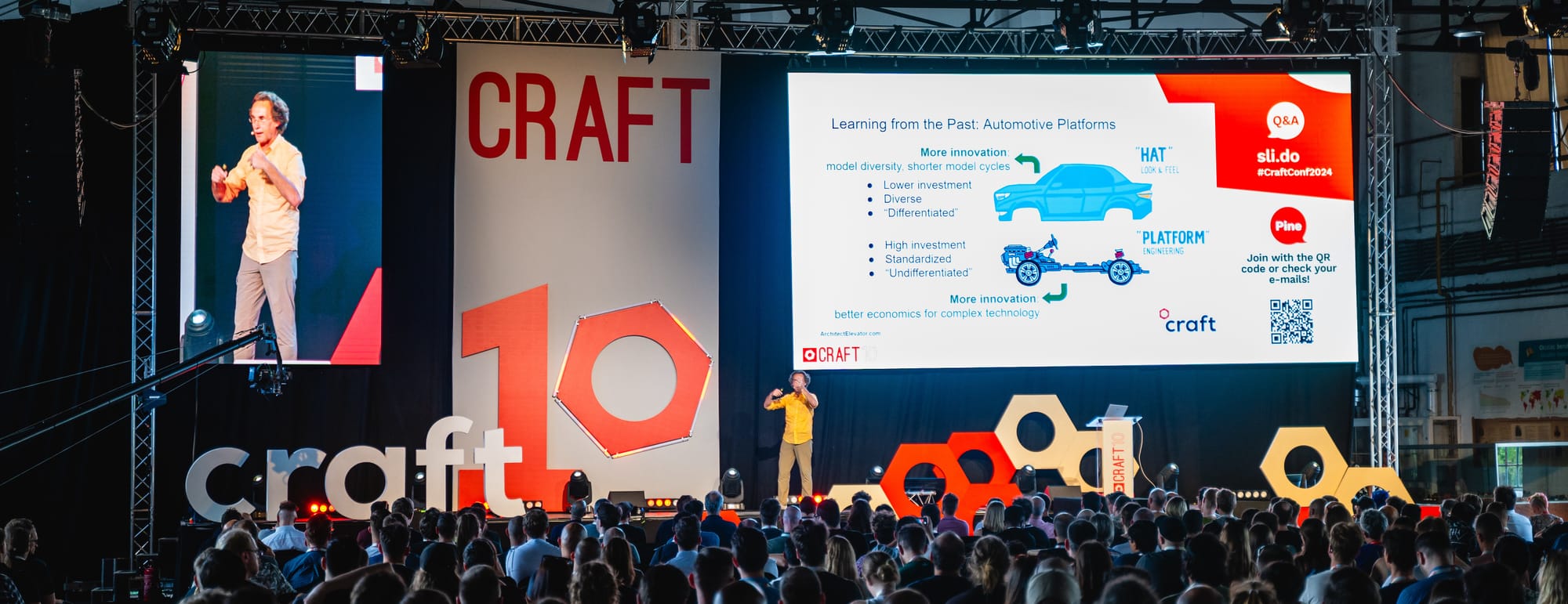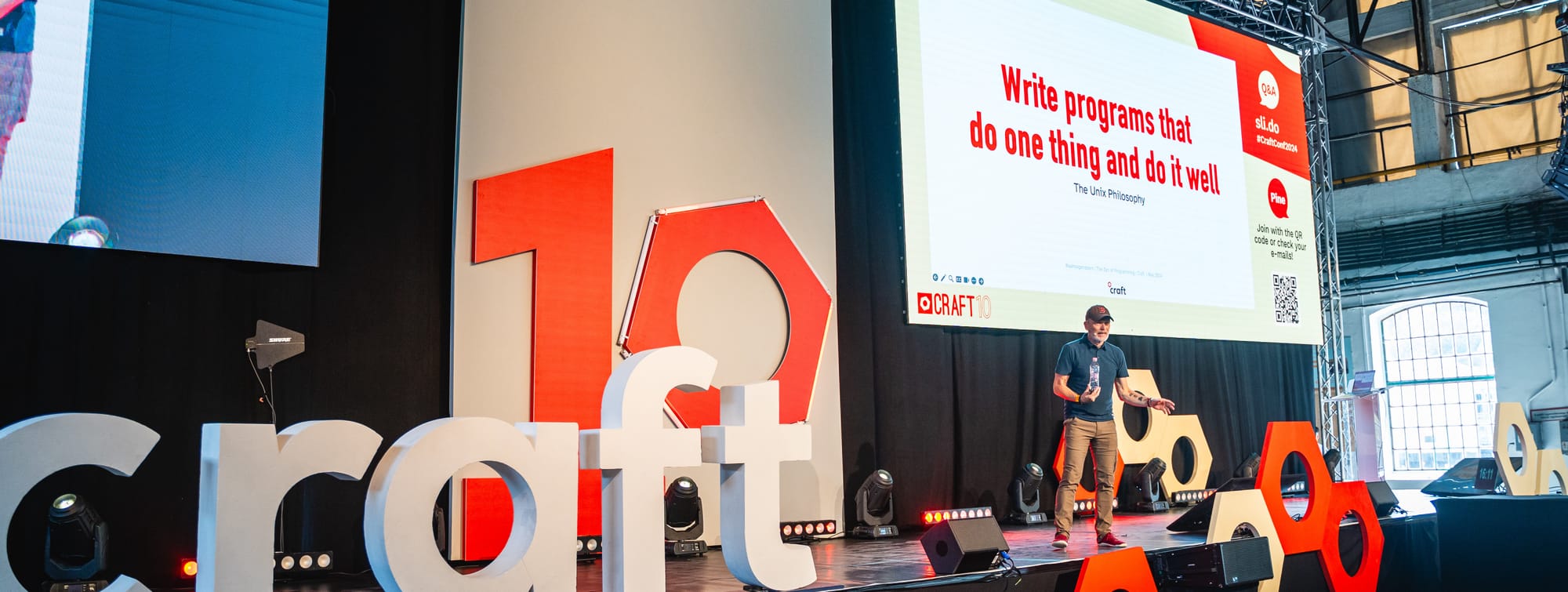10 takeaways from the 10th Craft Conference

As I mentioned in my latest Friday updates newsletter, I had the chance to participate in this 2-day tech conference last week. I took a lot of notes and this morning I finally had time to distill them and select ten takeaways that stayed with me.

We were living through 15 years of 0% interest rate, with a lot of innovation. That was unique and might not happen again for a long time.
I don’t believe in job security, but I believe in career security. Do more stacks (not just languages, but functions too, like QA, DevOps, PM, etc.), understand the business, work with Product, move from cost centers to profit centers. Understand the fact that your job is to make money.
Gergely Orosz: What’s Old is New Again
Managers manage resources, leaders drive impact. The best teams have multiple people with leadership skills. Traditional role-dependent leadership is outdated - leadership is behavior. The soft skills required for this are learnable, and are a great investment of time for an IC, because they are transferrable and resistant to change - which might not be true for hard skills. Key leadership skills:
👥 People Skills
🚀 Driving Results
🌐 Big Picture Thinking
🏠 Ownership
🌟 Leading By Example
🧠 Influencing
Irina Stanescu: Beyond Coding - IC Leadership is Here to Stay
Architecture is how we understand, discuss, and improve our approaches to Learning, Designing, and Decision-making. Architecture Topologies are thinking models and practices to understand and evolve the approach to architecture (no architecture → architecture from outside of the scope → in scope architecture → anybody architecture) in the different scopes of the organization (team / multi-team / organization). Taking inspiration from Team Topologies: consider Architects working as Enabling Teams.
Eduardo Da Silva: Towards Sustainable Learning, Designing and Decision-making

Good platforms are abstractions, not compositions. To create good abstractions, you need to understand the business domain. Platforms don’t try to anticipate every use case and instead drive innovation: If your users haven’t built something that surprises you, chances are that you didn’t create a platform. Omitting essential details has a big risk of creating a dangerous illusion. (For example: Remote procedure call is an illusion of a local call, an illusion that falls apart the moment the network becomes slow, unreliable or insecure, you realize the cost of traffic, the topology changes, etc…) Find the balance between more detail (too much complexity) and less detail (insufficient choice). Good abstractions reduce cognitive load because they form a mental model with cohesive language.
Gregor Hohpe: Platforms: Build Abstractions, not Illusions
Measuring developer productivity and improving developer productivity are not the same things. Quantitative metrics tend to measure for control, quantitative together with qualitative measure for change. Your definition of productivity will depend on audience, purpose, and business goals. SPACE is not a metric or set of metrics, but a framework that contains all metrics (including bad ones too). Its value is to validate that there are no gaps in your chosen definition of productivity.
Laura Tacho: Why Your Productivity Metrics Fail
Four strategies for efficient managing up:
📷 Extend the lens: use empathy and shared language, and understand what’s in for a change for every internal and external stakeholder.
🧑🔬 Use an experimentation mindset and separate what you can control, influence, and are just concerned about. Find the controllable and influenceable aspects of your concern areas.
🫂 Be vulnerable and transparent, and lead by example to your manager too.
🤝 Say “partner up” instead of “manage up”: don’t treat your boss as an idiot, collaborate, ask for feedback.
Tricia Broderick: Tips for Managing Up
Luck is a perception: two people in the same situation (lottery winning) can feel exceptionally lucky (I won a million dollars!) or unbelievably unlucky (5 people had the winning numbers so we had to share 5 million dollars!). Lucky people have positive thinking, resilience, flexibility, and are actively looking out for opportunities and taking experiments, increasing their chances to win.
Richard Wiseman: The Luck Factor

Computer Science has always been about one thing: Translating ideas into programs. CS is the study of how to take a problem and map it onto machine-executable instructions. The goal of CS has always been that programs are implemented, maintained, and understood by humans — but humans suck at all of these things.
AI greatly expands access to computing to anyone who can express themselves in natural language. The vast majority of people building "software" will not be programming: they will be interacting with an AI. Over time, CS will look more like Electrical Engineering: A more technical skill set necessary in some very specialized occupations.
Matt Welsh: Large Language Models and the End of Programming

FaST Agile is solving some potential challenges of Team Topologies like difficulty planning cross-team initiatives, rigid team allocations, specialized skills being spread too thin and multiple-team code ownership — with its own challenges around breadth of knowledge, team health/dynamics, and efficient group discussions.
Organizations consisting of microteams (forming around solving one item of work then disbanding) use contextual leadership, have better communication practices, progress daily with fewer estimates and easier refinements, while broadening the skills of their members faster. They solve a simple small problem every day.
James Shore: A FaST Way to Scale and Sander Hoogendoorn: Getting Unstuck. Strategies for Surviving in a Rapidly Changing Post-Agile World
Getting business approval for rewriting a legacy application depends on it having significant value, tangible measurable goals, short delivery, minimal operations impact, and a proof of concept with a proof of scale. Data-first opportunities have a bigger chance of support because data is corporate gold. Focus on Flows and Stores. Data is more stable and easier to change than code.
Dave Thomas: How to Innovate in a Legacy
This was just a small glimpse of the dozens of talks. If you liked it, Craft 2025 has a few Super Early Bird tickets still available until the 7th June. Non-affiliated link, I just really enjoyed this event.